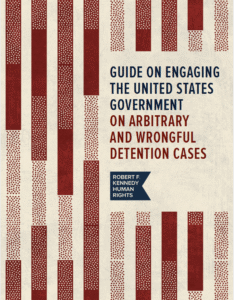Robert F. Kennedy Human Rights stands in solidarity with civil society organizations in Zimbabwe’s capital, Harare, following the government’s condemnable ban on multiple non-governmental organizations (NGOs) operating in the city.
In June 2021, the Provincial Development Coordinator (PDC) of Harare, Tafadzwa Muguti, issued a directive requiring all NGOs operating in Harare to seek permission to operate through his office and submit work plans and information on projects by July 9, 2021. PDCs are Presidentially-appointed officials, and the establishment of that post was met with controversy.
Local human rights organizations assert that the objective of this directive is to control the operations of all NGOs in Harare, noting that there is no binding policy that has been translated into legislation giving PDCs the power to regulate NGOs. The Crisis in Zimbabwe Coalition has explained that the directive’s goals are “meant to criminalise operations of non-governmental organisations critical to the authoritarian nature of the Zimbabwean government.”
On July 29, PDC Muguti issued a press statement noting 40 NGOs which complied with the directive and effectively banning all NGOs which did not comply, effective immediately. Zimbabwe Lawyers for Human Rights, on behalf of Zimbabwe Human Rights NGO Forum and the Crisis in Zimbabwe Coalition, filed an urgent application challenging Muguti’s directive.
This directive is a disturbing development that takes place against the backdrop of a broader crackdown on civic space in Zimbabwe. The Mnangagwa regime has in the past threatened to deregister NGOs, for operating outside their mandates and/or propping up the opposition, and to craft laws to regulate NGOs. RFK Human Rights joined Southern African Human Rights Defenders Network, Zimbabwe Lawyers for Human Rights, and the Committee to Protect Journalists last month in urging Special Rapporteurs at the United Nations and African Commission on Human and People’s Rights to intervene in a concerning trend of the Zimbabwe government stifling dissent and suppressing the activities of human rights defenders and journalists.
Active NGOs and civil society organizations are fundamental to an open, free, and democratic society because of the role they play in protecting and promoting human rights and the rule of law. The Constitution of Zimbabwe, as well as International and regional legal instruments to which Zimbabwe is a party, including the International Covenant on Civil and Political Rights (Art. 22) and the African Charter (Article 10), recognize freedom of association as a fundamental right. As the International Center for Not-For-Profit Law explains, the right to freedom of association “enables individuals to come together to pursue shared interests and achieve common goals – to act collectively to improve their lives,” and because of this, “[t]he laws governing associations and other groups should enable, rather than impede, freedom of association.”
Robert F. Kennedy Human Rights strongly condemns any action to illegally curtail the ability of civil society organizations to freely operate and calls on the government of Zimbabwe to reverse the directive immediately.




